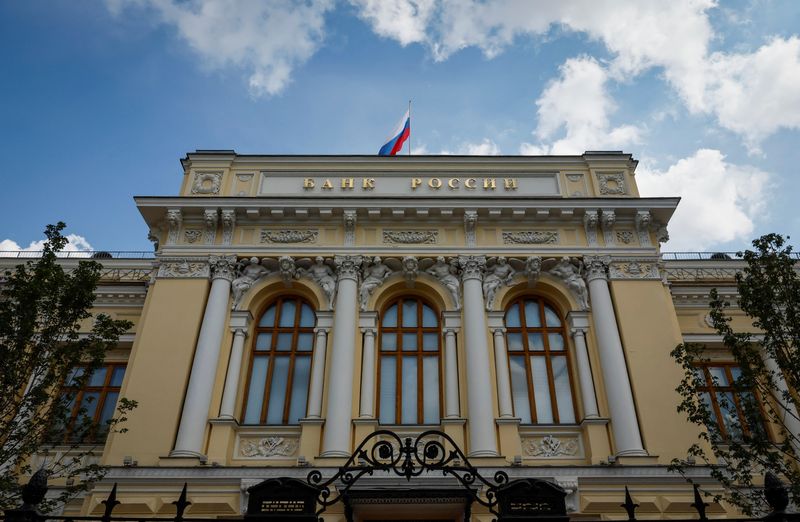Russian central bank to resume domestic FX market interventions from January
2023.11.27 07:37

© Reuters. FILE PHOTO: A Russian state flag flies over the Central Bank headquarters in Moscow, Russia, August 15, 2023. A sign reads: “Bank of Russia”. REUTERS/Shamil Zhumatov/File Photo
MOSCOW (Reuters) – The Russian central bank said on Monday it would resume domestic foreign exchange market interventions from January 2024, taking into account FX purchases deferred since August, as well as the government’s spending of rainy day funds to finance its budget deficit.
The central bank in August stopped buying foreign currency until the end of the year to avoid aggravating pressure on the rouble, which tumbled past 100 to the dollar in August and September.
“From January 2024, the Bank of Russia is resuming operations on the domestic foreign currency market connected to replenishing and using National Wealth Fund (NWF) funds, including taking into account all operations carried out with NWF funds in 2023,” the central bank said in a statement.
In announcing the resumption, the central bank added a crucial caveat that its interventions would be the difference between the purchases deferred from Aug. 10 to Dec. 31 and the volume of NWF spending on financing the government’s budget deficit for 2023.
“This is very unexpected news,” said CentroCreditBank economist Yevgeny Suvorov, anticipating that NWF expenditures would be higher than the amount of deferred purchases.
“Therefore, from the start of 2024, the central bank will not buy foreign currency (what it did not buy in August-December), but will increase its sales,” Suvorov said. “This is very good news for the rouble!”
The rouble did not react on Monday, continuing to hover near the more than five-month high it hit last week.
Under its budget rule, Russia sells foreign currency from the NWF to make up for any shortfall in revenue from oil and gas exports, or makes purchases in the event of a surplus.
The central bank conducts those operations on behalf of the finance ministry, which resumed its interventions in January after a hiatus of several months, shunning what it terms “unfriendly” Western currencies in favour of .
But on the back of recovering energy revenues, the finance ministry switched from sales to purchases in August, heaping more pressure on the rouble and causing the central bank to halt its usual mirroring of the finance ministry’s operations to try and limit rouble volatility.








